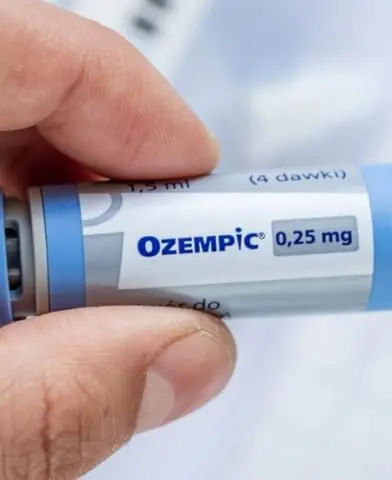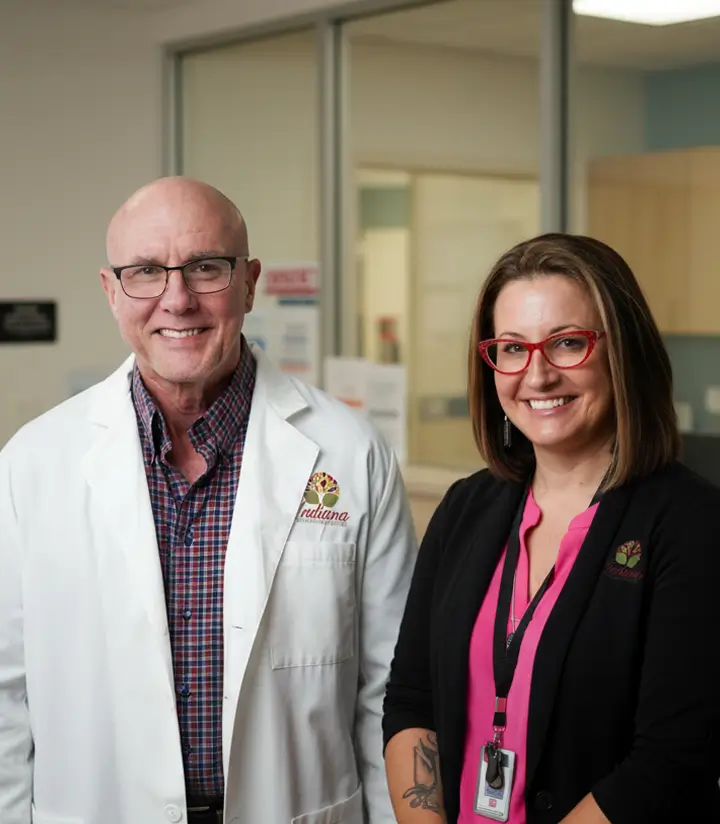
Drug Addiction Treatment Near Carbondale, Illinois
Clinically Reviewed by:
In Carbondale, Illinois, there is a significant issue with drug addiction. Many people struggle with addiction, such as misuse of opioids, meth, and cocaine, affecting the mental health of teens and adults. Fortunately, addiction treatment centers near Carbondale focus on helping individuals recover.
These facilities provide essential support and resources to address the challenges of drug addiction, emphasizing both physical and mental well-being. Seeking assistance from these centers can be a vital step towards a healthier and more fulfilling life for individuals grappling with addiction.

Key Takeaways
Treatment centers near Carbondale aid recovery, addressing both physical and mental well-being. Here’s what you need to know:
- From detox to outpatient, different care levels help individuals based on their needs and intensity.
- Drug treatment centers offer diverse therapies and various programs for recovery.
- Understanding insurance coverage and payment options is crucial for financial planning during rehab.
Indiana Center for Recovery offers various addiction treatment options. Learn more about our services by calling (844) 650-0064 today.
Substance Abuse Statistics in Illinois
The Centers for Disease Control and Prevention states that Illinois, which previously accounted for a large portion of drug overdose deaths in 2017, continues to report concerning figures. Nationally, there was a 30 percent increase in drug overdose deaths in 2020, followed by a 15 percent rise in 2021, reaching an estimated 108,000 deaths.
Shockingly, among 14 to 18-year-olds, overdose fatalities surged by 94 percent from 2019 to 2020 and then by 20 percent from 2020 to 2021. Despite a slight dip in illicit drug use among surveyed middle and high school students from 2019 to 2020, the overdose crisis remains pressing.
Importance of Addiction Treatment Centers
Addiction treatment centers are crucial in helping people overcome the challenges of addiction and lower the risks of drug overdose. These centers provide a supportive environment for individuals struggling with substance abuse, offering specialized programs for recovery. The importance of these facilities lies in their ability to address both the physical and mental aspects of addiction.
Through counseling, therapy, and medical support, these facilities help individuals understand the root causes of their addiction. Doctors aim to develop coping strategies for a healthier life.
Levels of Care in Addiction Treatment
Addiction rehab centers offer various levels of care to address substance use disorders and mental health treatment needs. Each level provides different intensities of support and services tailored to individual needs.
Detox Program
A detox program is a critical first step in the recovery process, providing a safe and monitored environment for individuals to withdraw from substances. Experienced staff help manage withdrawal symptoms, ensuring the process is as comfortable and secure as possible. This level of care is essential for addressing the physical aspects of substance use disorders (SUD) and preparing individuals for further treatment.
Inpatient Residential Program
Inpatient treatment, a residential program, offers a supportive and immersive environment for individuals to focus on their recovery. Clients reside at the treatment facility, allowing for a break from the triggers of daily life. In addition to addressing substance use, these programs often incorporate mental health treatment services to address co-occurring disorders comprehensively.
Within the inpatient setting, clients benefit from various treatment options, including individual counseling, group therapy, and recreational activities such as art therapy. The structured nature of these programs aids people in building coping skills, receiving education on substance use, and developing a foundation for lasting recovery.
Outpatient Treatment
Outpatient treatment offers flexible care options for individuals who don’t require 24-hour supervision. Clients attend therapy sessions and receive treatment services at home or in a supportive environment. Outpatient care allows individuals to maintain daily responsibilities while focusing on their recovery journey.
Partial Hospitalization Program
Partial hospitalization programs (PHPs) offer a higher level of care than traditional outpatient treatment. Clients attend treatment sessions such as counseling programs during the day and return home in the evenings. PHPs provide structured treatment services, including talk therapies, counseling, and medical support, while allowing individuals to maintain independence.
Holistic Services at Addiction Treatment Centers
Drug treatment centers provide a range of comprehensive services to address substance use disorders and co-occurring mental health issues. These services aim to cater to individual needs, offering evidence-based treatment plans and support from medical professionals.
Behavioral and Alternative Therapies
Drug treatment centers utilize diverse therapeutic approaches, including cognitive behavioral therapy (CBT), dialectical behavior therapy (DBT), and alternative methods such as art, music, and equine therapy.
These therapies go beyond traditional approaches, addressing not only the behavioral aspects of substance use but also providing creative outlets for expression and healing. They are particularly beneficial for individuals with mental health disorders and contribute to the overall effectiveness of treatment programs.
Medication-Assisted Treatment (MAT)
For people dealing with opioid or alcohol addiction, medication-assisted treatment (MAT) is a vital component. MAT combines FDA-approved prescription drugs with counseling and behavioral therapies to enhance recovery. It helps manage withdrawal symptoms and cravings, providing a holistic approach to addiction recovery.
Dual Diagnosis Treatment
Many individuals with substance use disorders also face mental health issues. Dual diagnosis treatment addresses both aspects simultaneously, recognizing the interconnected nature of mental health and addiction. This integrated approach ensures that individuals receive comprehensive care, enhancing their chances of successful recovery. Drug treatment centers also offer a variety of treatment programs, including intensive outpatient programs, family therapy, and specialized alcohol rehab.
Insurance Coverage and Cost of Rehab
Understanding the cost of rehab is crucial for patients seeking addiction treatment. Many rehab facilities accept health insurance, such as Medicare and Medicaid, to help cover expenses. Individuals can verify their insurance plans with their insurance provider to understand the coverage included in their plans. This often includes residential treatment, detox centers, and other components of an addiction treatment program.
Exploring payment options is essential for those without insurance coverage. Some facilities offer flexible payment plans or financial assistance to make rehab more accessible. By clarifying insurance coverage and exploring payment options, patients can navigate the financial aspects of rehab and focus on their journey to recovery.
Benefits of Attending Drug Rehab
If you’re dealing with drug addiction in Illinois, seeking help from treatment centers can make a major difference. Here are the benefits that you need to know:
- Personalized Plans: Each person gets a treatment plan that fits their needs, helping them on their unique path to recovery.
- Skilled Staff: The people at these centers are experts who care about your well-being and are dedicated to helping you get better.
- Peer Support: Being around others who understand what you’re dealing with can make a huge difference in staying motivated and connected during recovery.
- Secure Environment: Treatment facilities provide a safe and organized place for recovery, minimizing distractions and focusing on your well-being.
- Holistic Approaches: These centers use different ways to help, addressing not only the physical but also the mental and emotional aspects of addiction.
- Education and Coping Strategies: You learn about addiction and gain strategies to handle challenges, giving you the tools to stay on the path to recovery.
Choosing a drug addiction treatment center means choosing a supportive and effective way to overcome addiction. With personalized plans, caring staff, and peer support, these centers provide the right environment for a successful journey toward a healthier and happier life.
Challenges During Recovery at Rehab
Overcoming drug addiction is a journey filled with challenges. Withdrawal symptoms can be tough, both physically and emotionally. Motivation to stick with treatment may waver, and external triggers can pose difficulties. Some individuals face stigma and judgment, hindering their willingness to seek help. Access to quality treatment services may also be limited, especially in certain areas.
Additionally, co-existing mental health issues can complicate recovery. However, acknowledging these hurdles is the first step towards finding solutions. With the right support, dedication, and a personalized treatment plan, individuals can navigate these hurdles and work toward a successful and lasting recovery.
Considerations When Choosing a Treatment Center
When you’re picking a place for help with drug addiction, think about a few important things. First, check if the place is officially recognized. Make sure the staff is well-qualified, supportive, and has experience with addiction.
Next, see how they help people – everyone’s different, so the program should fit each person. Also, make sure the rehab location is close to your home since staying close to family members will be easier. Visit the rehab center to find out if you feel comfortable. Check the cost and if they take your insurance.
Ask about their payment procedure and treatment plans. Choose a rehab facility that offers ongoing support, like group meetings or counseling. See what others say about the place online, read reviews, or ask friends. And ask if family can be part of the process. Communication with family is key.
Frequently Asked Questions (FAQ)
How do you respond to a recovering addict?
Encourage and support a recovering addict by expressing positivity and understanding. Acknowledge their efforts and progress in overcoming addiction. Offer words of encouragement, emphasizing that the recovery process is time-consuming and setbacks are a natural part of it.
Remind them that seeking help is a symbol of strength and that you believe in their ability to make positive changes. Be patient, compassionate, and ready to assist them in their recovery journey.
What are the types of drug addiction treatments available at Indiana Center for Recovery?
Indiana Center for Recovery offers various types of drug addiction treatments. One of the most popular treatments is counseling, where individuals talk with a trained professional about their thoughts and feelings. Medications might be prescribed to help manage cravings and withdrawal symptoms.
Support groups provide a space to share experiences and get encouragement. Inpatient programs involve staying at the rehab facility for intensive treatment, while outpatient programs allow flexibility for daily activities. Finding a treatment plan that suits the individual’s needs and situation is important.
Indiana Center for Recovery
Carbondale residents struggling with opioid, meth, or alcohol addiction can access specialized care that understands Southern Illinois’ unique challenges. Indiana Center for Recovery offers evidence-based treatment close enough for family involvement while providing the necessary space for healing.
When withdrawal becomes overwhelming, our medically supervised detox ensures your safety and comfort with 24/7 clinical support, helping you stabilize with confidence.
Continue your recovery journey through our comprehensive addiction programs combining counseling, medication management, and relapse prevention skills. For those needing additional structure, our residential rehabilitation surrounds you with peer support and professional guidance daily, while our integrated dual diagnosis approach addresses co-occurring mental health concerns.
Take the first step toward recovery by calling (844) 650-0064 to discuss admission options. Our Terre Haute addiction treatment center, the closest ICFR facility to Carbondale, offers nearby programs with specialists ready to guide your path to lasting recovery.






 100% Confidential
100% Confidential
